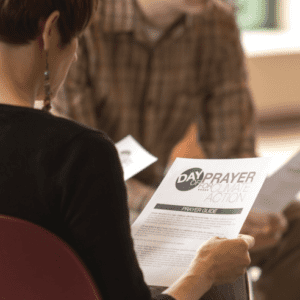Thereafter, Hagar used another name to refer to the LORD, who had spoken to her. She said, “You are the God who sees me.”
– Genesis 16:13
Tears streaked her cheeks as she stood in the tiny, cluttered bedroom at the back of the house. Her shoulders heaved as she sobbed. She dug through the trash bags strewn around the floor; trash bags that held all her pitiful possessions. She desperately searched for something to wipe off the snot that was running over her lips.
Not wanting to mess up the few clothes she had, she yanked the sheet off her bed to wipe her face and thought, How did I get here…again?
Once again she felt utterly beyond herself. She had gotten out of prison, for the second time, just two months ago—and headed right back to the crack house. Three days ago, someone brought her to this housing program. Only three days sober and here she was, breaking rules up for the umpteenth time. Now she was being asked to leave.
She flung herself on the dirty carpet as she wailed, begging God for help. Immediately, she heard it. Something inside cracked. The sound was so loud and clear in her ears that she looked at her legs to see if a bone had snapped. But both legs were intact, and she realized the very real sound she heard was not a bone breaking but her will shattering. She was undone.
For the first time in her life, she whispered to God, “I will do whatever you want.”
Women overcomers and the workplace
Many employers might look at Ava on that floor and see only her past, instead of her potential. If they did, they would miss out on a remarkably resilient person who could change their lives and who, as an excellent employee, could change their business.
Thankfully, where Ava started is not where she ended. Like many overcomers who have become corporate executives, business owners, counselors, and teachers, Ava became a world changer.
Nonprofit organizations have been investing in women like Ava for years, but for-profit companies can make a significant impact as well by providing women overcomers with jobs–good jobs. Companies looking to hire women like Ava–women who have overcome incarceration, addiction, poverty, and engagement in the sex trade–should not be afraid.
Are there risks? Sure, but the risks are consistent with hiring any other employee if you put the right practices and culture in place. The following two tips provide business professionals with a foundation for doing so.
First, we recommend companies partner with local nonprofit organizations that have successful track records of challenging and supporting women overcomers to achieve their dreams.
Through partnerships, companies can develop a hiring pipeline to find valuable employees as nonprofit organizations vet candidates for workplace readiness. In such partnerships, the company will provide women an opportunity for a new future found through economic stability.
But the company will also benefit from the women’s unique skills and perspectives.
Second, employers need to be willing to see people differently by putting on hiring bifocals.
There are stories in scripture of women not accepted by society but seen by God; Hagar, Rahab, the woman at the well. As Christians, we need to look again through the bifocals of mercy and justice.
Yes, you can see the felony convictions or gaps in employment from trips to prison or rehab. But you will also see the inherent dignity and Imago Dei in each person. And you will see someone with skills like tenacity, resilience, creativity, and innovation.
When women overcomers decide to change, they make terrific employees. They bring the kind of highly valued skills into the workplace that can be difficult to teach other new employees. One doesn’t survive years of addiction, poverty, or incarceration without learning to think quickly, act fast, and adapt as necessary.
Over the years, we have seen many women like Ava decide it is time to change. Once they set their tenacious minds to walking out of devastation, it is astonishing how far they can go and how far they can push us outside of our own biases.
So, where is Ava now?
The days that followed for Ava were challenging. She worked the program through the nonprofit organization supporting her. She enrolled in every training program they offered. The day she left the housing program, her hands trembled as she turned the ignition of her new car. With conviction, she said, “You got this! If you can face what you have the past 15 years, you can face anything.”
Within days, she landed a job as a server. Thanks to the training she completed in the housing program, Ava was prepared and made a positive impression. She was promoted to assistant manager and began hiring other employees in recovery. Since then, she has gone through good times and bad, but she continues to do what she and every other overcomer does best–she keeps getting back up again.
As Ava reflects on all God has done, she says, “God has been in the big; God has been in the tiny. God has been in the everything.” Like with broken bones, where broken wills are mended, overcomers are made even stronger, making strong-willed, resilient women who are ready to change the world.
_____
In their words…
We asked two overcomers three questions to help us better understand the world through their eyes.
What strengths did you develop in your old life that are playing a key role in your new life, and how do you see that in your work life today?
Jane*: My determination and willingness to do anything necessary to get what I wanted. In my work life now, I am determined to be the best employee I can be and am willing to try new things and do whatever is necessary for my company. This has helped me to advance quickly in my current job.
Karen: I had to survive and hustle in the daily grind on the streets. I was driven by a goal on the streets, but today I am goal-oriented for the betterment of others and myself with the help of God. I have a wealth of knowledge about how to achieve that goal, about the value of daily effort, daily attention, and daily planning, and about the obstacles that get in the way of achieving a goal.
What words of hope and encouragement would you offer to a woman who is struggling today?
Jane: Don’t give up and never stop trying. I have tried many times to get sober and have failed many times. Never stop trying; you may succeed on the first time or the 25th time.
Karen: When everything seems like an uphill struggle, think of the view from the top. Nobody ever said getting clean was easy, and it takes discipline to maintain it long term. And while the uphill climb may seem impossible at first, the result is one of the most rewarding accomplishments you’ll ever experience. The reward is regaining your life and reaching your true potential, making the hard work at the beginning totally worth it. Many of us also suffer from low self-esteem, which perpetuates the cycle of addiction. But struggling with an addiction doesn’t mean we’re incapable, weak, or unworthy. And it certainly doesn’t mean we can’t change our lives around. We are all worthy of being happy and of living our lives to the fullest.
What practical advice would you offer an employer who is considering hiring a woman with so much trauma in her past?
Jane: Empower her.
Karen: Provide PTSD and sensitivity training for coworkers and supervisors. I get triggered a lot at work and people are not aware of things they do or say that can be triggering.
*Names have been changed to respect privacy.

 Dr. Shannon Deer (L) and Cheryl Miller (R) wrote Business Doing Good: Engaging Women and Elevating Communities. Together, they run BDG Partners, where they train and consult with companies on effectively hiring women who have overcome challenging pasts and nonprofits who serve those women. For two decades, Miller ran a housing program that put the book’s principles into practice. Deer researched these principles using her business expertise as a professor.
Dr. Shannon Deer (L) and Cheryl Miller (R) wrote Business Doing Good: Engaging Women and Elevating Communities. Together, they run BDG Partners, where they train and consult with companies on effectively hiring women who have overcome challenging pasts and nonprofits who serve those women. For two decades, Miller ran a housing program that put the book’s principles into practice. Deer researched these principles using her business expertise as a professor.


